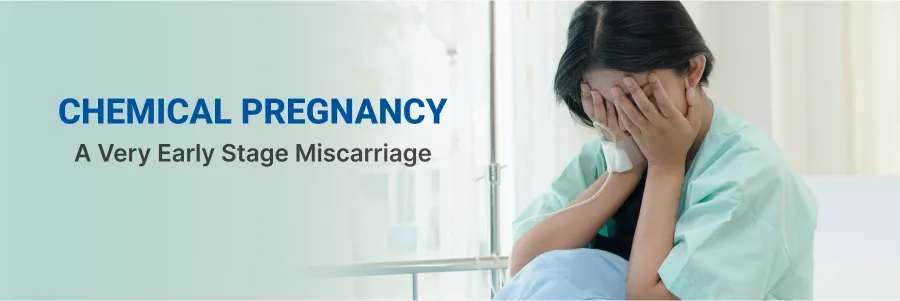- Cardiology 84
- Dermatology 45
- Endocrinology 33
- ENT 16
- Fertility 190
- Gastroenterology 78
- General-Medicine 81
- Gynecology 80
- Hematology 19
- Infectious-Diseases 33
- Neurology 52
- Oncology 34
- Ophthalmology 23
- Orthopedics 69
- Pediatrics 31
- Procedure 23
- Public-Health 144
- Pulmonology 59
- Radiology 8
- Urology 68
- Wellness 161
- Woman-and-child 77

Understanding Chemical Pregnancy: Causes, Symptoms, & Prevention
Successful pregnancy of a woman depends on several factors. However, at times a woman becomes pregnant but loses the child shortly after implantation of the embryo. This early pregnancy loss is known as a chemical pregnancy or sometimes a biochemical pregnancy. Miscarriages can happen because of many reasons and can happen at any stage of pregnancy. In this blog, we will try to understand what is a chemical pregnancy, how does it occur and are there any ways by which one can avoid it?
What is a Chemical Pregnancy?
A chemical pregnancy refers to a very early miscarriage that occurs shortly after implantation, typically before the fifth week of gestation. It is called a "chemical" pregnancy because it can only be detected through blood tests or early pregnancy tests due to the presence of pregnancy hormones, such as human chorionic gonadotropin (hCG), in the bloodstream.
Chemical Pregnancy Facts
- Early Loss: Chemical pregnancies are often considered the most common type of miscarriage, accounting for about 50-75% of all miscarriages.
- HCG Levels: The diagnosis is based on the detection of low levels of hCG in blood tests and the subsequent drop in hormone levels.
- Symptoms: Many women experience no noticeable symptoms, making the miscarriage appear as if their menstrual period is simply slightly delayed or heavier.
Chemical Pregnancy Symptoms
Symptoms of a chemical pregnancy can be quite subtle, and many women may not recognize them. Common symptoms include:
- Light Bleeding: Slight spotting or light bleeding, which may be mistaken for an early or heavy period.
- Cramping: Mild cramping similar to menstrual cramps.
- Positive Pregnancy Test: An initial positive pregnancy test followed by a negative test as hCG levels drop.
Reasons for Chemical Pregnancy
Chemical pregnancies can result from various factors, including:
- Chromosomal Abnormalities: Genetic issues with the embryo are a leading cause.
- Hormonal Imbalances: Issues with progesterone or other hormones necessary for pregnancy maintenance.
- Uterine Abnormalities: Structural issues in the uterus can impact implantation.
How to Avoid Chemical Pregnancy
While it's challenging to prevent a chemical pregnancy entirely, some steps may help:
- Preconception Care: Ensure optimal health before conception through a balanced diet and prenatal vitamins.
- Healthy Lifestyle: Avoid smoking, excessive alcohol, and drugs, and manage stress effectively.
- Regular Monitoring: Early prenatal care and monitoring can help manage any underlying issues.
Chemical Pregnancy Causes
The primary causes of a chemical pregnancy include:
- Genetic Abnormalities: Chromosomal defects in the embryo that prevent proper development.
- Hormonal Issues: Insufficient hormone levels to support the pregnancy.
- Uterine Problems: Conditions like fibroids or polyps that affect the uterine lining.
Ready to take control of your health journey? Book your appointment now and start your path towards wellness today!
Book an AppointmentTreatment for Chemical Pregnancy
Treatment for a chemical pregnancy typically focuses on managing symptoms and addressing any underlying issues:
- No Specific Treatment: Since it is an early miscarriage, treatment usually involves monitoring and managing bleeding.
- Medical Evaluation: Follow-up with a healthcare provider to ensure there are no complications and to discuss future pregnancy planning.
Chemical Pregnancy Diagnosis
Diagnosis is confirmed through:
- Blood Tests: Measuring hCG levels to confirm pregnancy and monitor hormone changes.
- Ultrasound: May be used if needed to check for any abnormalities.
Conclusion
Chemical pregnancies, while common, can be emotionally challenging. Understanding the factors that contribute to these early miscarriages can help in managing and preventing them. Regular health check-ups, a healthy lifestyle, and early monitoring are key strategies in addressing chemical pregnancies and supporting reproductive health. If you suspect a chemical pregnancy, consult with a healthcare provider to receive appropriate care and guidance.
Frequently Asked Questions
A chemical pregnancy is very common, occurring in about 10% of known pregnancies. More than 50% of miscarriages are chemical pregnancies.
The probability of chemical pregnancy is higher in women in their late thirties or above. More than one-third of chemical pregnancy cases occur in women older than 40 years.
Pregnancy loss in the first few weeks usually happens once and shouldn’t interfere when you are planning a pregnancy the second or third time. Most women go on to have successful pregnancies afterward. If you experience recurrent pregnancy loss, consult your doctor to understand the underlying reasons.
While you can't prevent a chemical pregnancy, maintaining a healthy lifestyle by avoiding habits like smoking or drinking can help. Ensuring abdominal safety can also be beneficial.
Experiencing a chemical pregnancy can be emotionally challenging. Support from loved ones and counseling may help cope with feelings of loss or disappointment.
Factors such as advanced maternal age, hormonal imbalances, and underlying health conditions may increase the risk of recurrent chemical pregnancies.

- Cardiology 2132
- Dermatology 168
- Endocrinology 135
- ENT 97
- Fertility 217
- Gastroenterology 232
- General 478
- General-Medicine 1685
- Gynecology 169
- Hematology 85
- Infectious-Diseases 208
- Neurology 207
- Oncology 345
- Ophthalmology 65
- Orthopedics 187
- Pediatrics 83
- Procedure 72
- Public-Health 209
- Pulmonology 126
- Radiology 13
- Second Opinion 311
- Urology 294
- Wellness 600
- Woman-and-child 447
- Others 10217
Related Blogs
If you have any questions, please fill out the enquiry form or call us, and we will get back to you promptly.
040-68334455